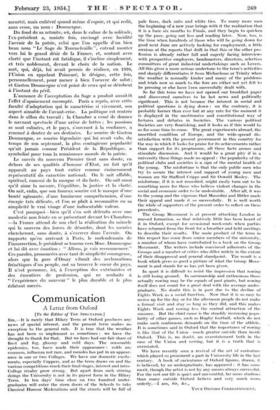Communication
A Letter from Oxford
[To the Editor of THE SPECTATOR.1
Sra,—It is rarely that Hilary Term at Oxford produces any news of special interest, and the present term makes no
exception to the general rule. It is true that the weather has not been so unpleasant as sometimes : we have the drought to thank for that. But we have had our fair share of frost and fog, gloomy and cold days. The seasonable epidemics, too, have made their appearance : colds are common, influenza not rare, and measles has put in an appear. ance in one or two Colleges. We have our domestic excite- ments, especially Cuppers, and as the term draws on and the various competitions reach their final stages, interest and inter- College rivalry grow strong. But apart from such stirring doings the University is not in its gayest form in the Hilary Term. In ten days' time close on two hundred under- . graduates will enter the stern doors of the Schools to take Classical Honour Moderations and the streets will be full of
pale faces, dark suits and white ties. To many more men the beginning of a new year brings with it the realization that it is a bare six months to Finals, and they begin to quicken up the pace, going out less and reading later. Now, too, is the time when hundreds of those who will be going down for good next June are actively looking for employment, a little anxious at the reports that drift in that this or the other pro- fession is already rather full and eagerly facing interviews
with prospective employers, headmasters, directors, selection committees of great industrial undertakings such as Levers. All this gives a more serious undertone to the term's activities and sharply differentiates it from Michaelmas or Trinity when the weather is normally kinder and many of the problems and trials now so much to the fore are either not yet felt to be pressing or else have been successfully dealt with.
So far this term we have not opened our breakfast paper and discovered ourselves to be hot news and politically significant. This is not because the interest in social and political questions is dying dOwn : on the contrary, it is probably keener than ever but at any rate for the moment it is displayed in the unobtrusive and constitutional way of lectures and debates in Societies. The various political Societies are very flourishing, and it looks as if this would be so for some time to come. The great experiments abroad, the unsettled condition of Europe, and the wide-spread dis- satisfaction with the present government in this country for the way in which it looks for praise for its achievements rather than support for its programme, all these facts arouse and stimulate discussion. And it would be a great pity if in a university these things made no appeal : the popularity of the political clubs and societies is a sign of the mental health of the young. The misfortune is that the only public men who try to secure the interest and support of young men and women are Sir Stafford Cripps and Sir Oswald Mosley. The misfortune, if it is not remedied, might easily turn out to be something more for those who believe violent changes in the social and economic order to be undesirable. After all, it was to the young and the vigorous that Mussolini and Hitler made their appeal and made it so successfully. It is well worth the while of supporters of the present order to reflect on these precedents.
The Group Movement is at present attacking London in
massed formation, so that relatively little has been heard of it in Oxford, except for occasional week-ends when parties have returned from the front for a breather and held meetings to describe their results. The main product of the term in this respect has come from senior members of the university, a number of whom have contributed to a hook on the Group Movement. The writers include convinced adherents of the Groups and a number of critics who differ widely in the extent of their disapproval and general standpoint. The result is a book which gives as good a picture of what the Group Move- ment is and stands for as has yet been given.
In sport it is difficult to resist the impression that rowing is still losing ground. In oarsmanship and enthusiasm those actually rowing may be the equals of past giants, but rowing itself does not count for a great deal with the average under- graduate. No doubt this is in part due to the decline of Eights Week as a social function. Now that it is so easy to motor up for the day or for the afternoon people do not make a formal visit and stay as long as they did, and this makes Eights Week and rowing less the central attraction of the summer. But the chief cause is the steadily increasing popu- larity of other games, such as Rugby football, which do not make such continuous demands on the time of the athlete. It is sometimes said in Oxford that the importance of rowing is like that of the Union—much greater outside than inside Oxford. This is, no doubt, an overstatement both in the case of the Union and rowing, but it is a truth that is overstated.
We have recently seen a revival of the art of caricature which played so prominent a part in University life in the last century. A book of caricatures of Oxford figures, drawn, it is believed, by an undergraduate, has appeared : it has some merit, though the artist is not by any means always successful. For the rest our life is quiet and uneventful, far more studious than many outside Oxford believe and very much more orderly.—I am, Sir, &c., YOUR OXFORD CORRESPONDENT.
















































 Previous page
Previous page